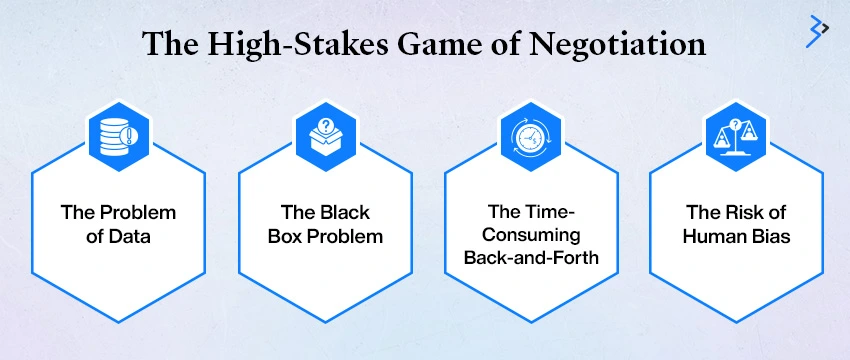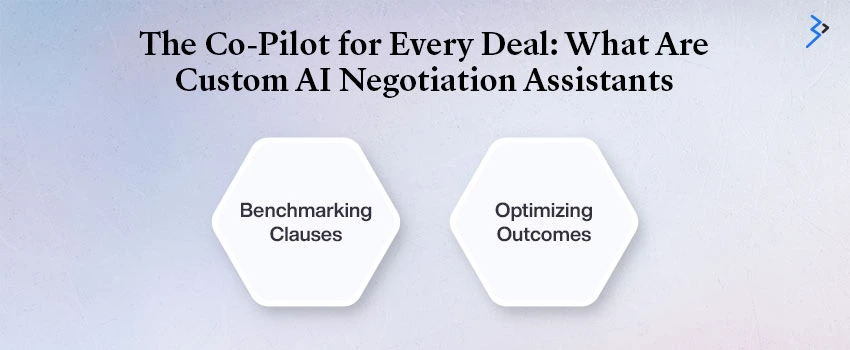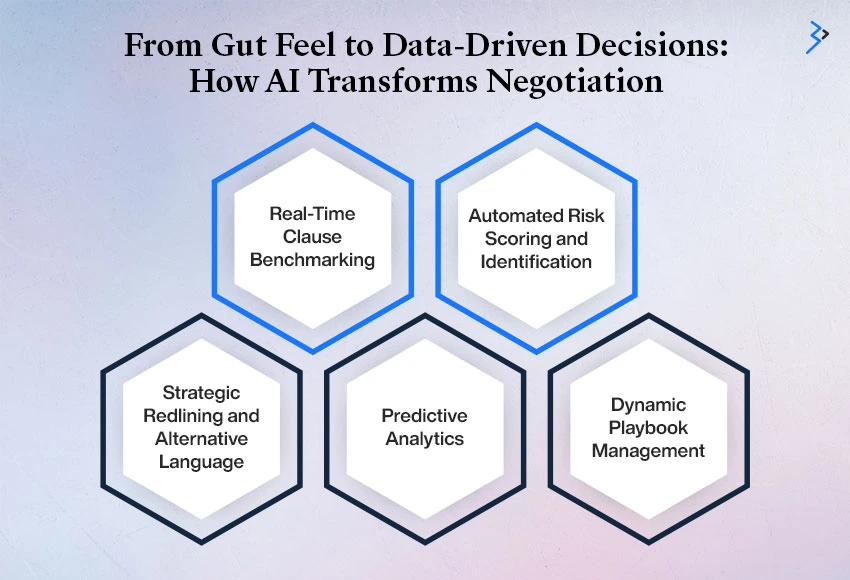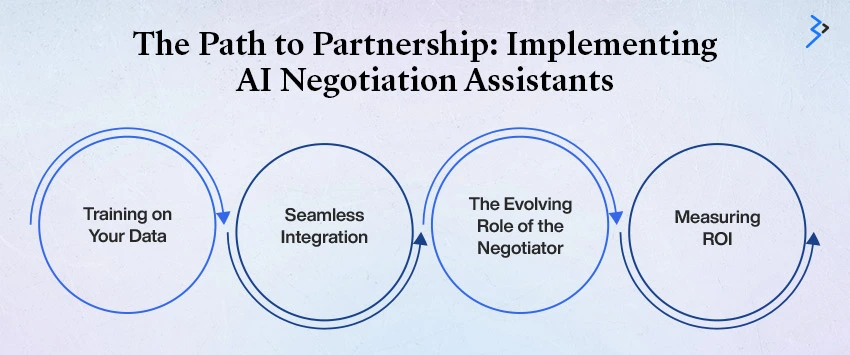Negotiation is crucial to the business world; every contract feels like a battle. Traditionally, it has relied on people’s instincts and past experiences, which often means a lot of back-and-forth communication.
In this old way of negotiating, gut feelings can sometimes be more important than data, and the outcomes depend on who has more time, resources, or determination. This process can be slow, inefficient, and risky, as human biases and the lack of real-time information can lead to missed opportunities.
Now, imagine if every negotiator had an intelligent assistant to help them. This assistant could quickly analyze contract details, compare them with thousands of similar deals, and recommend the best options. The concept is not a dream; it is becoming a reality with Custom AI Negotiation Assistants designed to streamline the negotiation process and assist teams in making better decisions.
This shift transforms negotiations from an instinct-based art to a data-driven science. With these AI assistants, businesses can negotiate smarter, leading to quicker, more profitable outcomes.
The High-Stakes Game of Negotiation

The art of the deal is fraught with challenges that traditional, manual methods cannot overcome at scale.
- The Problem of Data: Traditional negotiation is blind. Negotiators often have limited access to data on market standards, historical deal concessions, or the actual risk of a proposed clause. Individuals must rely on their personal memories or disorganized internal records, which are often incomplete and inconsistent.
- The Cost of Inconsistency: Negotiations are inconsistent without a centralized, data-driven approach. One negotiator might grant a concession that another holds firm on, leading to a patchwork of agreements that can complicate future operations and create unfair precedents.

- The Time-Consuming Back-and-Forth: The process of redlining and revision is a significant bottleneck. Legal and sales teams can spend weeks, even months, in a tedious cycle of sending documents, waiting for feedback, and manually updating drafts. Wasting valuable time can lead to delays in essential business operations and revenue. A survey found that negotiation cycles for annual agreements often take between one and three months.
- The Risk of Human Bias: Even the most experienced negotiators can let emotions, time constraints, or personal biases influence their decisions. As a result, they may make valuable concessions or overlook critical risks while trying to close a deal.
These inefficiencies have a real impact. Poor contract management and negotiation slow down business, create unnecessary risks, and ultimately drain resources, making it clear that a more innovative, more modern approach is needed.
The Co-Pilot for Every Deal: What Are Custom AI Negotiation Assistants?

A Custom AI Negotiation Assistant is sophisticated software that leverages advanced machine learning development and natural language processing (NLP) to act as a real-time partner for a human negotiator. Unlike generic AI, a custom assistant is explicitly trained on your company’s unique historical data, legal playbooks, and negotiation strategies.
It’s more than just a redlining tool. It understands the context, intent, and risk of specific clauses, allowing it to provide actionable insights and recommendations on the fly.
- Benchmarking Clauses: The AI analyzes a proposed clause and compares it to your company’s historical agreements, industry standards, and internal best practices. It can tell you if a clause is a standard term, an aggressive ask, or a complete outlier, providing the data needed to make a confident decision.
- Optimizing Outcomes: The AI doesn’t just flag problems; it provides solutions. It can suggest pre-approved, alternative language that is more favorable to your company while still being acceptable to the counterparty. Shifting the negotiation from simple “yes or no” questions to a more strategic, data-driven discussion enhances the quality of the conversation.
The transformation is already making an impact. In one case, an AI assistant helped a global retailer streamline procurement negotiations, delivering results that exceeded expectations while cutting costs and effort. By leveraging advanced AI machine learning services, the retailer was able to automate complex decision-making, enhance negotiation strategies, and achieve greater efficiency across operations.
From Gut Feel to Data-Driven Decisions: How AI Transforms Negotiation

AI brings unprecedented intelligence to every stage of the negotiation process, turning it into a proactive and data-driven exercise.
1. Real-Time Clause Benchmarking
During a negotiation, every clause is a variable. A custom AI assistant eliminates the guesswork by providing a real-time risk analysis. The AI can compare a counterparty’s proposed terms to a company’s “ideal,” “acceptable,” and “walk-away” positions. For example, a lawyer reviewing a contract can get a risk score on a liability clause and a recommendation on countering it within seconds. This process is more efficient than manually digging through a contract repository or relying on a colleague’s memory.
2. Automated Risk Scoring and Identification
AI can instantly and accurately identify hidden risks that a human reviewer might miss. It can highlight ambiguous language, flag clauses that deviate from compliance standards, or spot inconsistencies that could lead to legal disputes. A study showed that AI-driven redlining can improve risk identification accuracy by 15-25% over human reviewers, who are more prone to errors due to fatigue or high volumes.
3. Strategic Redlining and Alternative Language
The most powerful feature of an AI assistant is its ability to suggest strategic, data-backed edits. Instead of just marking a clause for rejection, the AI can propose alternative language that has been proven successful in similar past negotiations. This procedure speeds up the notoriously slow redlining process. AI contract review can cut manual redlining and markup tasks by up to 70%, allowing legal teams to reduce human review time significantly.
4. Predictive Analytics
AI can turn your past into your future. By analyzing your entire contract repository, AI can uncover patterns and insights a human could never see. For instance, it can anticipate the types of concessions a specific counterparty will likely accept and identify the clauses a particular industry often rejects. A clear understanding of the situation gives your negotiation team a significant advantage, enabling them to customize their strategy for a more effective and successful outcome.
5. Dynamic Playbook Management
Legal playbooks can quickly become outdated in a manual process. An AI assistant ensures every negotiation adheres to the latest company policies and legal guidelines. The system receives regular updates with the most current information. Ensuring that every negotiator has access to compliant language, regardless of when the deal occurs, is essential.
The results of this transformation are significant. Companies that leverage AI for their legal and negotiation tasks report a 44% productivity increase for their legal teams and an average reduction of 10-20% in legal spend. This shift isn’t just about saving time; it’s about making your entire negotiation function a proactive, strategic driver of business value.
Read More – How Generative AI Is Revolutionizing Contract Review: Faster Approvals, Lower Risk
The Path to Partnership: Implementing AI Negotiation Assistants

Adopting AI negotiation assistants is a strategic journey, not a simple purchase. A few key considerations are critical to realizing the full benefits.
- Training on Your Data: The true power of a “custom” AI assistant comes from training it on your company’s own data. Understanding your risk tolerance, business objectives, and past negotiation experiences is essential. The process requires a clean and well-organized repository of past contracts to build a robust foundation.
- Seamless Integration: The best AI assistants don’t operate in a vacuum. They must integrate seamlessly with your existing technology stack, including your CRM, CLM, and other business systems. Establishing a seamless, comprehensive workflow ensures that data flows freely while maintaining a single source of truth.
- The Evolving Role of the Negotiator: AI is not here to replace negotiators. It’s here to empower them. The role shifts from the tedious, administrative work of redlining to the strategic, high-value work of building relationships and solving complex problems. Negotiators become strategists, leveraging AI to handle the tactical details and focus on the big picture.
- Measuring ROI: The return on investment from AI is multifaceted. It’s measured not only in time saved and reduced legal spend, but also in better deal outcomes, mitigated risk, and the ability to scale your operations without a linear increase in headcount. Organizations are seeing that the long-term benefits far outweigh the initial investment. A survey by IBM found that 53% of organizations already see a return on their AI investments.
Read More – From Manual Chaos to Automated Precision: How AI Workflow Management Redefines Contracting
Conclusion: A Strategic Partner for a Smarter Future
The intuitive, manual negotiation era is giving way to a new age of data-driven precision. Custom AI Negotiation Assistants are no longer a luxury but a necessity for any business that wants to secure the best possible outcomes in every deal. By benchmarking clauses, providing real-time risk analysis, and suggesting optimal language, these tools empower your team to move beyond gut feel and enter every negotiation with a strategic, data-backed advantage.
At Brainvire, we understand that implementing AI in a high-stakes function like negotiation requires a tailored approach. We work with you to train a custom AI model on your unique data and integrate it seamlessly into your existing workflows. Our expertise ensures a smooth transition, turning your negotiation process from a chaotic and risky exercise into a powerful, data-driven growth engine. We help you transform your negotiation function into a competitive advantage.
FAQs:-
Custom AI assistants go beyond simple document storage or redlining features. They are trained on your company’s unique historical contracts, negotiation playbooks, and strategies, enabling them to benchmark clauses, flag risks, and propose context-specific alternatives in real time.
No, AI is designed to empower negotiators, not replace them. While AI handles repetitive, tactical tasks like clause benchmarking and risk scoring, human negotiators focus on strategic decision-making, relationship-building, and creative problem-solving.
For best results, the AI requires access to well-organized past contracts, negotiation notes, legal playbooks, and compliance guidelines. The richer and cleaner the data, the more effective the AI becomes at providing relevant and accurate insights.
ROI can be seen in both the short and long term. Businesses often notice immediate time savings in redlining and contract review, with measurable productivity increases and reduced legal spend over time. Additionally, improved deal outcomes and risk mitigation compound the long-term benefits.
Yes. Modern AI negotiation assistants are designed for seamless integration with existing enterprise systems such as CRM, CLM, and other workflow tools. This ensures negotiators can work within a unified ecosystem without duplicating efforts or disrupting current processes.
Related Articles
-
Leveraging the Power of Artificial Intelligence in Cybersecurity
The rise in cybercrime and the need to invest heavily in cybersecurity has led to concerns that companies may become more vulnerable to cyberattacks as they adopt AI and machine learning in their operations. However, AI and machine learning have potential in cybersecurity responses to combat advanced cyber threats. The use of these technologies may enable companies to react to and prevent attacks in more sophisticated ways.
-
From Automation to Intelligence: AI & ML’s Role in Industry 4.0
What is AI & ML in Industry 4.0? “Industry 4.0” refers to the fourth industrial revolution, which combines digital technologies with physical processes in manufacturing and industry. Artificial Intelligence (AI)
-
Prominence of Business Intelligence in the Success of Any Business
The world today is demanding smarter processing and use of technologies that can possibly automate or ease out every possible task. And many companies have started adopting business intelligence in




